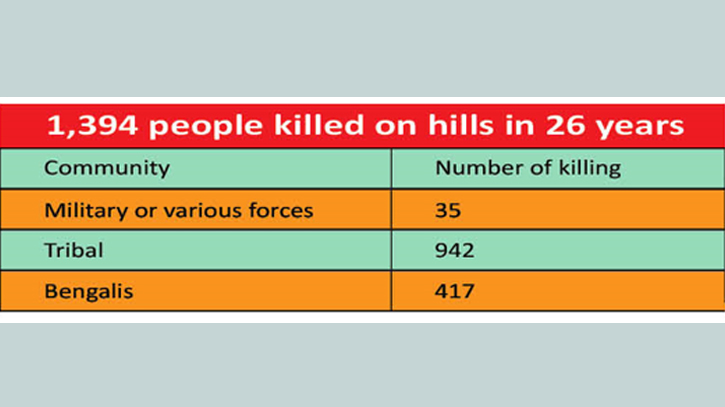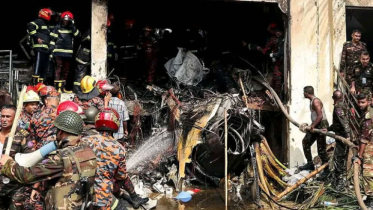
Photo : Messenger
In 1997, the Awami League government initiated a 'Peace Pact' with the aim of establishing peace in the Chittagong Hill Tracts. Despite the passage of 26 years since the agreement, the region continues to witness ongoing violence, characterized by incidents such as murders, disappearances, and extortion.
According to available data, a disturbing tally reveals that 1,394 individuals have lost their lives at the hands of armed terrorists affiliated with Hill organisations since the signing of the Hill Peace Accords. Tragically, among these casualties, 35 were members of the military or various security forces, while a staggering 1,359 were civilians.
A closer examination of the civilian casualties reveals a deeply troubling pattern. Specifically, 942 victims belonged to various tribal or small ethnic groups, underscoring the vulnerability of these marginalised communities. Additionally, 417 individuals identified as Bengalis have also fallen victim to the protracted violence in the Chittagong Hill Tracts.
According to credible sources, the Chittagong Hill Tracts have been plagued by extensive extortion activities conducted by certain regional organizations, perpetuating a cycle of violence that includes murder and kidnapping to sustain their dominance.
A recent tragic incident underscores the gravity of the situation, as two members of the United People’s Democratic Front (UPDF) fell victim to assailants in Khagrachari on Wednesday. The incident unfolded in the Durchhari area of Mahalchhari upazila on the morning of January 24, resulting in the deaths of Ravi Kumar Chakma (65) and Shanta Chakma Bimal (52). Regrettably, Rahindra Chakma Tipon (32), another UPDF worker, remains missing following the attack.
Niran Chakma, spokesperson for the organisation, asserted that the deceased were dedicated UPDF workers. Angya Marma, an organiser for UPDF, provided additional details, revealing that the three UPDF workers were stationed in Mahalchari’s Durchhari for organisational activities. The assailants, identified as members of the 'New Mask' group, launched a sudden and brutal attack, resulting in the immediate deaths of two workers and the disappearance of another.
Officer-in-Charge (OC) Nasir Uddin of Mahalachari Police Station has confirmed that two bodies were recovered from the scene. The deceased have been transported to Khagrachari Sadar Hospital mortuary for post-mortem examinations, according to the official.
This unfortunate event follows a previous tragedy on December 11 of the preceding year, when four individuals, including the former central president of Pahari Chhatra Parishad (PCP), Bipul Chakma, were killed by militants.
The victims included PCP's former central president Bipul Chakma, vice president Sunil Tripura, youth forum leader Liton Chakma, and UPDF member Ruhin Tripura. This incident stands out as one of the most significant events in the hills since the killings of 2018.
In the wake of these challenges, Kujendra Lal Tripura, a veteran politician elected three times consecutively from Khagrachari, has assumed the role of the Ministry of Chittagong Hill Tracts Affairs as the state minister in the newly formed government of the Awami League. Expressing commitment to restoring peace in the hills, he emphasised that various aspects of the peace agreement have been implemented, with ongoing efforts and a determination to fully implement the remaining provisions in collaboration with the government and the people of the Chittagong Hill Tracts.
It is crucial to note that the Awami League government signed a peace agreement with the Chittagong Hill Tracts Janasanghati Samiti (JSS) on December 2, 1997, with the aim of ending the rebellion and bloodshed in the hills. At that time, the Paharis were united under the JSS banner, led by Jyotirindra Bodhipriya Larma (Santu Larma). However, the formation of the UPDF in 1998, led by Prasit Bikash Khisa, opposed the agreement and demanded full autonomy for the Chittagong Hill Tracts. The situation continues to pose complex challenges that demand sustained efforts towards achieving lasting peace and stability in the region.
Then a lot of blood was spilled on the hill in the JSS-UPDF conflict. Santu Larma’s anger over the implementation of the peace agreement also led to a split in the hill organizations. JSS was broken again to form JSS (MN Larma). Prasit Bikas Khisa’s party also broke up and formed another organisation called UPDF (Democratic).
Messenger/Fardin








